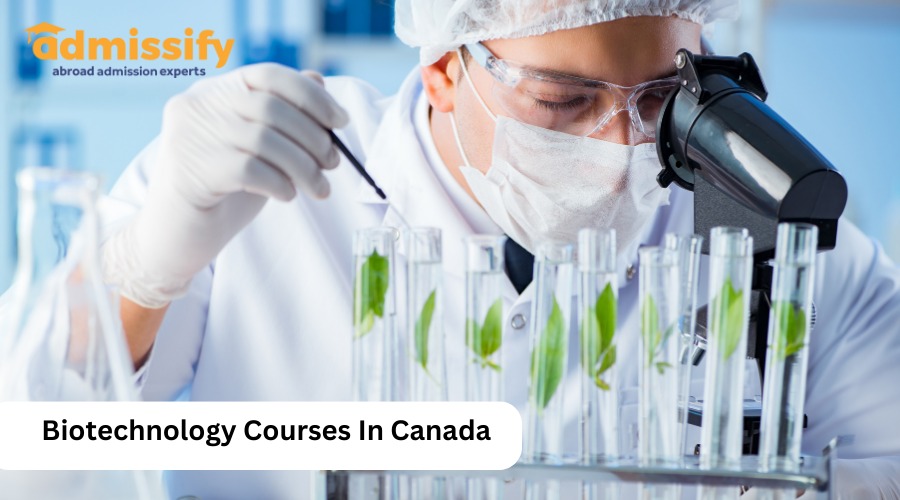Last Updated on December 13, 2024
If you have a strong desire to use biology to develop novel goods, processes, and organisms for the betterment of humanity, choosing biotechnology as your area of study will be an excellent decision for you. There are many nations that provide biotechnology courses, with Canada being one of the top ones. In this article, we will learn about the biotechnology courses in Canada.
What is biotechnology
Genetically engineered foods are a prime instance of a product created using living cells in biotechnology. Thus, biotechnology and genetic engineering are interrelated. Biotechnology first arose as a separate field at the beginning of the 20th century in the food industry, subsequently expanding into other fields like medicine and the environment.
Modern biotechnology’s five branches—human, environmental, industrial, animal, and plant—help us fight hunger and disease, develop goods more safely, cleanly, and effectively, lessen our impact on the environment, and conserve energy.

Why study biotechnology in Canada?
Candidates interested in pursuing biotechnology for higher education can consider Canada as their ideal country. The chance of doing a biotechnology degree in Canada is certain to alter the lives of the individuals who take it. Pursuing a biotechnology degree in Canada can shape your life in a better way with endless options.
Here are the following reasons why you should choose a biotechnology course in Canada
- The biotechnology sector is growing rapidly in Canada, it is home to prominent research institutions, universities, hospitals, and businesses.
- The top-ranked and most esteemed educational institutions in Canada provide a broad spectrum of biotechnology courses and specialties.
- Universities in Canada offer degrees like the Bachelor in Biotechnology, the Master in Biotechnology, and the Diploma in Biotechnology under the broad umbrella of Biotechnology.
- Huge Job prospects in biotechnology, as research revealed that 33% of biotech companies have skills shortages in this field.
Top Universities for biotechnology Courses in Canada
- University of Toronto, Toronto
Top courses: BSc. Molecular biology and biotechnology, Msc. Biotechnology
- The University of British Columbia, Vancouver
Top courses: Msc. molecular biology and biochemistry
- McGill University, Montreal
Top courses: MASc. biotechnology
- McMaster University, Hamilton
Top courses: MSc biochemistry, Msc biomedical sciences
- University of Montreal, Montreal
Top courses: Msc. biochemistry
- University of Ottawa, Ottawa
Top courses: Msc. Biochemistry
- The University of Calgary
Top courses: B.Sc. biochemistry
- University of Manitoba
Top courses: BSc. biotechnology
- York University, Toronto
Top courses: BSc. Biotechnology
Eligibility Criteria for Bachelor’s in Biotechnology course in Canada
Specific requirements must be met by applicants for bachelor’s in Biotechnology courses in Canada for international students. The points listed below are:
- Bachelor’s Degree
The minimum grade requirement for international students pursuing a degree in biotechnology is a B in each of the four required core disciplines, including biology at the high school or intermediate level, academic history in English, chemistry, and mathematics.
- English Language Proficiency Test Scores
Students whose first language is not English must provide evidence of their English language proficiency. The following conditions apply:
- 6.5 overall IELTS score
- Score of 83,560 on the TOEFL
- A 70 CAEL rating
- 56 on the PTE test
- Canadian Study Permit
Students who wish to enroll in the BSc in Biotechnology program in Canada must submit an application for a Canadian study permit. After getting a university admissions confirmation, applications for a study visa will be submitted.
Eligibility criteria for master’s degree in Biotechnology course in Canada.
There are a few eligibility and entrance requirements to pursue a master’s in biotechnology course in Canada for international students, which are listed below
- Master’s degree
A student must have a minimum undergraduate GPA of 3.0 to 3.3 on a scale of 4.0 in order to be admitted to a master’s program in biotechnology in Canada. Two or three letters of recommendation, a current CV, and a letter of intent make up the remaining supplementary admissions requirements.
- Proof of English Language Proficiency
For admission in biotechnology courses in Canada for international students whose first language is not English must submit their English test results.
International students must have a minimum TOEFL score of 93 or an IELTS score of 6.5 with no band lower than 7.5 in order to be admitted to the MSc in Biotechnology program in Canada.
- Canadian Study Permit
To enroll in a master’s program in biotechnology in Canada, international students must first apply for a study permit for the country. Only after confirmation of university admission may applicants submit applications for a study permit.
Please feel free to contact Admissify Education Experts with any more questions. We will assist you in creating a portfolio that will showcase your best qualities.
Scholarships in Canada for pursuing a degree in biotechnology.
International students can also receive internal and external scholarships from Canadian Universities.
| College/University | Scholarship | Details |
| University of Toronto | Scholarships and Grants | Based on merit, financial need, community engagement, leadership, and athletic performance |
| McGill University | McGill’s Entrance Scholarship Program. | Valued between $3,000 and $12,000 |
| University of Calgary | The University of Calgary International Entrance Scholarship | Valued up to $15,000 (Renewable |
Jobs and Career Opportunities after Biotechnology Course in Canada.
By creating methods and products to fight diseases, increasing food yields, and using biofuels to reduce greenhouse gas emissions, biotechnology students can considerably extend human life expectancy and improve quality of life.
The typical income for entry-level work in biotechnology ranges from $47,336 to $62,618 annually, according to ca.talent.com. Following are a few financially rewarding occupations for biotechnology graduates:
- Chemical engineer
- Biomedical engineer
- Medical scientist
- Biochemist
- Microbiologist
- Medical coder
- Environmental Scientist/Specialist
- Agriculture and Food Scientist
- Biological Technician
- Clinical Laboratory Technologist
- Process Development Scientists
Conclusion
When developing or producing various products, biotechnology makes use of biological systems, living organisms, or components of these. Students have high career prospects in the biotechnology business, which is expanding in many nations with Canada as one of its major countries. Research disciplines, work in the commercial sector, or entrepreneurship are just a few career options after this study.
We, therefore, hope that this blog helped you better comprehend both the specifics and the scope of biotechnology. Consult the specialists at Admissify Edutech if you want to study biotechnology or a related topic and plan to work as a research assistant or for a multinational corporation.
FAQs
What are some best colleges for biotechnology in Canada?
Some of the best colleges in Canada for biotechnology are listed below:
- University of Toronto
- The University of British Columbia
- McGill University
- University of Montreal
What is the scope of biotechnology in Canada?
Canada has a skills gap, thus there are employment prospects in biotechnology for those who are interested in working in the fields of agriculture, biosciences, environment, health, industrial applications, natural resources, nanotechnology, and genomics.
What is a biotechnology course?
Ans. Candidates for biotechnology degrees can choose from a variety of areas, including chemistry, biology, and information technology. Biotechnology is a significant area of medicine, where it aids candidates in learning about the manufacture of pharmaceuticals and the substances used in pharmaceuticals.
What are the top PG diploma courses in biotechnology in Canada?
| Name of the Institution | Course Name | Fees (in CAD) | Duration | Intakes | Admission Requirements |
| Algonquin College | Biotechnology-Advanced (Co-Op and Non-Co-Op Version) | $46,435.60 | 3 years | Fall and Winter | OSSD (Ontario Secondary School Diploma) or equivalentACE Certificate or GED certificate or mature student status as alternativesGrade 12 English and Mathematics with 60% and 65% (or higher) respectively)Biology Grade 11/12 with 65% or moreChemistry Grade 11/12 with 65% or moreEnglish language proficiency |
| Centennial College | Biotechnology-Advanced (Fast-Track) (Optional Co-Op) | $16,377 | 2 years | September, January, May | Degree or three-year college diplomaEnglish language proficiency and skills assessment |
| Georgian College | Biotechnology- Health Ontario College Diploma Program | $9,036.08 | 2 years | Fall and Summer | OSSD or equivalentGrade 12 English and MathematicsGrade 11/12 BiologyGrade 12 Chemistry |
| Concordia University | Biotechnology and Genomics (GrDip) | N/A | 1 year | September, January, May | B. Sc from an accredited institution with 15 creditsMinimum GPA of 3.0English language proficiency |
| Durham College | Biotechnology-Advanced (Fast-Track) | $8,956.68 (Year 1) + $7,823.94 (Year 2) | Two semesters | September | OSSD or Mature student status Grade 12 English and MathematicsGrade 11/12 Biology English language proficiency and other course-related requirements |
Is Biotechnology in demand in Canada?
An intriguing and rapidly expanding discipline, biotechnology integrates biology with engineering and technology. By 2029, Canada’s bio economy will probably need 65,000 more workers. Because of its uses in agriculture, medicine, and other industries, biotechnologists are in high demand.
Avinash Singh is a study abroad consultant with over 10 years of experience helping students achieve their academic goals. He is an expert in the US, Australian, German, and Canadian education systems and has helped hundreds of students secure admission to top universities around the world. In his spare time, Avinash enjoys traveling, hiking, and spending time with his family. He is also an avid reader and loves to learn new things.




